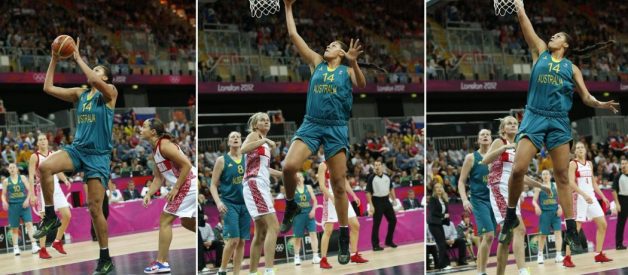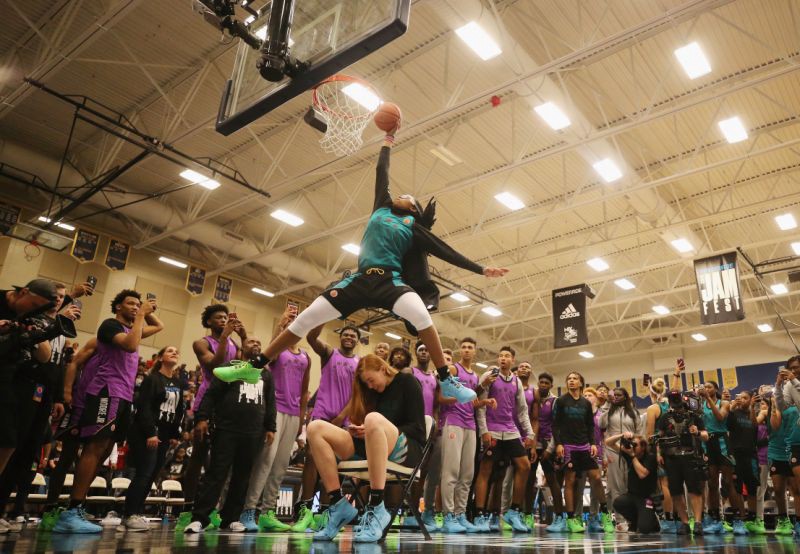 Fran Belibi won the McDonald?s All-American Game dunk contest and the internet went wild. Photo Cred: Mike Ehrmann/Getty Images for Powerade
Fran Belibi won the McDonald?s All-American Game dunk contest and the internet went wild. Photo Cred: Mike Ehrmann/Getty Images for Powerade
On March 25th, Francesca Belibi became the second girl in the history of the McDonald?s All American Game to win the dunk contest. She comes right after Candace Parker, the first ? and only then ? to have made it in 2004. Although it took 15 years for a female athlete to do this again, it took much less time for boys and men to go to the 18-year-old forward Instagram with comments that accused her of not being better than her main contestant, Scottie Lewis. Most of them wrote the exact same words: ?you only won because you?re a girl?.
Belibi, who has signed for a full scholarship with Stanford University and ranks third among ESPN?s girls high school recruits, doesn?t have the usual history with women?s basketball. She didn?t start playing until her freshman year and ? gasp! ? she doesn?t even want to play in the WNBA. Her dream is to be a doctor, hence the school choice, and despite not aiming a professional sports career nor having practiced any basketball until four years ago, her numbers as a senior with the Regis Jesuit High School (Denver, CO) are impressive: 21.8 points and 12.3 rebounds per game.
In other words, she?s a natural.
The dunks are what made Francesca Belibi known nationwide ? or even worldwide. The gyms where she plays are packed with boys, girls and adults who want to see the ?dunk girl?.
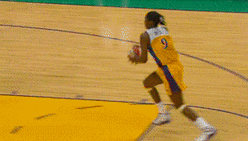 First dunk in the history of the WNBA, by Lisa Leslie, in 2002.
First dunk in the history of the WNBA, by Lisa Leslie, in 2002.
A dunk is, most of the time, seen as a men thing. At least that?s what those who still have something to express against women?s basketball say with the much primitive argument that the women?s game has no dunk. Even Elena Delle Donne once read in a ?mean tweets? segment with the Chicago Sky what a user from the social media had to say about it: ?Better be men?s professional lawn mowing though. The women?s game is fundamentally solid, but there?s no pizzaz?. She cracked to the affirmation getting to the conclusion that the lack of dunks in the WNBA is what makes that guy think that way
That now classic ?pizzaz? statement was written as a response to a SportsCenter story about the 6 foot 5 power forward having scored 45 points during an overtime game against the Atlanta Dream, which ended with a 100 to 95 victory by the Sky. To a numerous amount of male followers of the sports show, the fact that the game was extremely competitive and a player was able to put 45 points in 45 minutes could be completely diminished for the simple fact that there were no dunks or even an audience of ten thousands.
Professional female athletes are used to this criticism and comparison. The ?dunk issue? has always been a topic in conversations regarding how to make women?s basketball more appealing. Some are favorable to lowering the rim in order to make dunks more often???an idea defended by Elena Delle Donne herself and former USAWNT and UConn Women?s Basketball coach Geno Auriemma???and others just don?t see a point in making such a change just to please male watchers???the most recent speaker on that side is Nneka Ogwumike, a Los Angeles Sparks forward and President of the WNBA Players Association.
The point is: women do dunk, but not as many nor as often as men. The first dunk in the WNBA was in 2002, by Lisa Leslie. It took another six years for that to happen during an official game again, in 2008, by Candace Parker. More players accomplished it (such as Sylvia Fowles, Michelle Snow, Jonquel Jones, Deanna Nolan and even Diana Taurasi), but never during a regular season match. In the Olympic level, only in 2012 one of the ladies dropped a jam, the young Australian Center Liz Cambage.
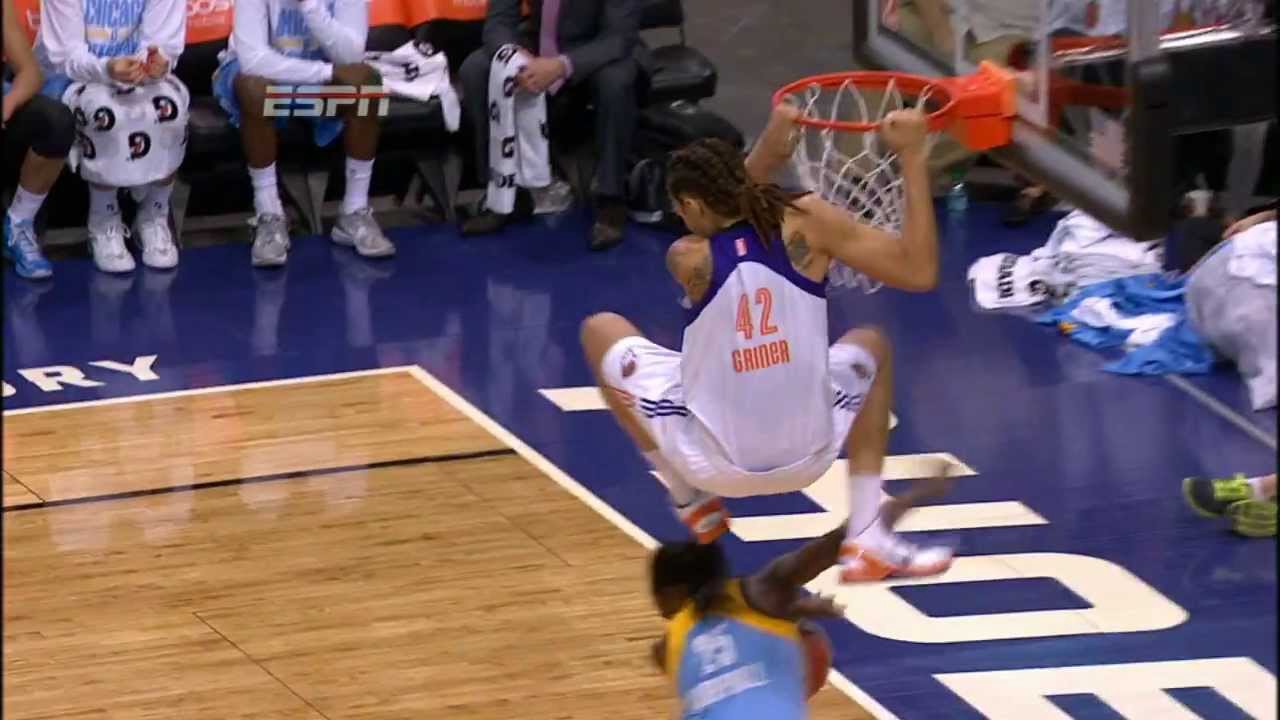 Brittney Griner dunking over a defender during a WNBA game. Photo Cred: ESPN Video
Brittney Griner dunking over a defender during a WNBA game. Photo Cred: ESPN Video
It?s obvious, then, that one will not see as many dunks when watching a female league game. However, they do happen once in a while, and the response is still very negative and filled with hidden prejudice.
Brittney Griner is the clearest example for that. The currently biggest dunker in the women?s game, who has an average of only two dunks a game in the WNBA, saw the worst feedback as soon as she started showing her skills. Instead of being impressed by her ability to use her 7’4″ wingspan to not only dominate on the paint, but also carry the ball, defend and shoot from the three point line, male viewers of her videos mocked of her single handed dunks, both handed dunks with a clear path and time taken to drop more jams. Even worse, her gender was put in doubt as people started insisting she was a transgender when she clearly stated many times that she was cisgender (she goes by the same sex established to her at birth, female).
The cycle is never ending: men say women?s basketball is not fun and not worth watching because there are no dunks; a woman dunks; men judge the dunk too easy; a woman dunks with speed and strength; men mock the women saying she?s a man or a lesbian (as if those were reasons to make fun of); a woman dunks better than a man; men deny recognizing that women are able to dunk as well as men and spread the word that the victory was given to her as pity.
What does it take then? History shows that ability alone is not enough when finding a way to increase the audience for women?s basketball, because the main issue is the internalized sexism and misogyny within the sports world. It is true that dunks make attendance higher. Fran Belibi?s games had full house for girls high school basketball games. But at what cost and how would that work in the professional level?
As Nneka Ogwumike says, women have been practicing forever to achieve the standard of top players with the rim in a certain height. How would lowering it change their game and what would it say about respecting the years women have dedicated to proving that their leagues deserve just as much attention and credibility as the men?s ones? And if the rim is lowered and the average amount of dunks raises, who could guarantee that it would actually increase TV rates and arena attendance on the professional level?
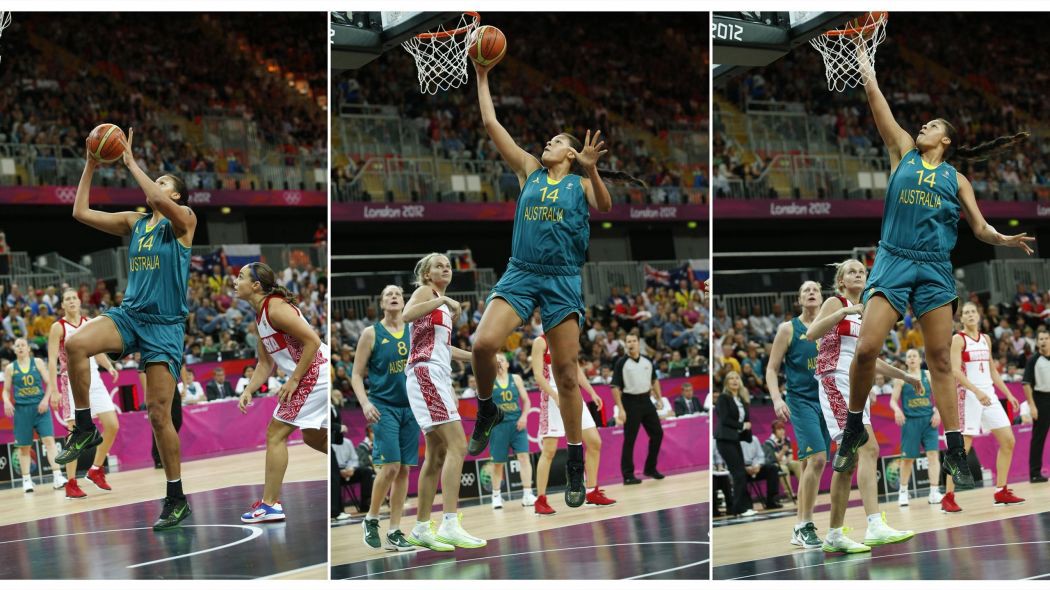 Liz Cambage became the first woman to dunk during the Olympic Games, in 2012
Liz Cambage became the first woman to dunk during the Olympic Games, in 2012
At the end of the day, a dunk is just two more points on the board and it?s not even in the stats sheet. From the Top 10 all-time scorers in the WNBA, only one of them has dunked during a game: Lisa Leslie. And the number one on this rank ? Diana Taurasi ? has almost 2.300 points more than her, never having dunked in her career.
Although dunks are fun and it would be nice to see more of them, the main solution would be a reeducation of how women?s basketball is seen. Even more importantly, a reeducation of the male mind towards women?s sports and women?s rights. It?s completely toxic and not at all helpful to have a female athlete ability being questioned as a result of comparison to their male counterparts? just to spread the negative conclusion that the WNBA or other leagues are not worth watching.
Truth is, women?s leagues have the most amazing players with the highest basketball IQs and athleticism levels. And it?s not settling to the male gaze that will bring it respect. It?s making the male gaze respectful of the game as it is, because it is already great.
